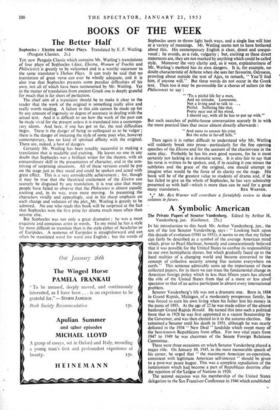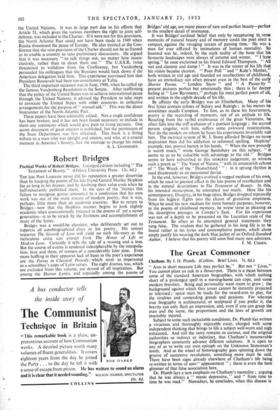A Symbolic American
The Private Papers of Senator Vandenberg. Edited by Arthur H. Vandenberg, jun. (Gollancz. 25s.) IN his introduction to this book Mr. Arthur Vandenberg, jun., the son of the late Senator Vandenberg, says : "Looking back upon this decade of evolution (1941 to 1951), it seems to me that my father can fairly be described as a symbol of the average American mind which, prior to Pearl Harbour, honestly and conscientiously believed that it was possible for the United States to confine its responsibility to our own hemispheric shores, but which gradually faced up to the hard realities of a changing world and became converted to the concept of collective security among free nations everywhere on earth." This sentence admirably sums up the importance of these collected papers, for in them we can trace the fundamental change in American foreign policy which in less than fifteen years has altered the role of the United States from that of a more or less aloof spectator to that of an active participanCin almost every international problem.
Senator Vandenberg's life was not a dramatic one. Born in 1884 in Grand Rapids, Michigan, of a moderately prosperous family, he was forced to earn his own living when his father lost his money in the panic of 1893. At the age of 22 he was made editor of the almost bankrupt Grand Rapids Herald. He turned this into such a political force that in 1928 he was first appointed to a vacant Senatorship by the Governor, and was then elected to it in the autumn election. He remained a Senator until his death in 1951, although he was nearly defeated in the 1934" New Deal" landslide which swept many of the best-known Republicans from office. For two vital years from 1947 to 1949 he was chairman of the Senate Foreign Relations Committee.
There were three occasions on which Senator Vandenberg played a major role. On January 10, 1945, in the most memorable speech of his career, he urged that "the maximum American co-operation, consistent with legitimate American self-interest" should be given to a post-war peace league. This was a complete repudiation of the isolationism which hadk become a part of Republican doctrine after the rejection of the-Lague of Nations in 1920.
The second occasion was his membership of the United States delegation to the San Francisco Conference in 1946 which established
the United Nations. It was in large part due to his efforts that Article 51, which gives the various members the right to joint self- defence, was included in the Charter. If it were not for this provision, the North Atlantic Pact could not have been made in 1949 when Russia threatened the peace of Europe. He also insisted at the Con- ference that the veto provision of the Charter should not be so framed as to enable a country to veto preliminary discussions. He argued that it was necessary "to talk things out, no matter how incon- clusively, rather than to shoot them out." The U.S.S.R. twice threatened to withdraw from the Conference, but Vandenberg persuaded his colleagues that the Russians would back down if the American delegation held firm. This experience convinced him that President Roosevelt had been too conciliatory at Yalta.
The third important occasion was in June, 1948, when he called up the famous Vandenberg Resolution in the Senate. After reaffirming that the policy of the United States was to achieve international peace through the United Nations, it advised the President to take steps to associate the United States with other countries in collective arrangements for the purpose of" mutual aid." This was the direct forerunner of the North Atlantic Pact.
These papers have been admirably edited. Not a single confidence has been broken, and it has not been found necessary to include in them any comments which would give pain to living persons. One secret document of great interest is published, but the permission of the State Department was first obtained. This book is a fitting tribute to a man who was upright and sincere, and who, at a crucial moment in America's history, had the courage to change his mind.
A. L. GOODHART.



































 Previous page
Previous page